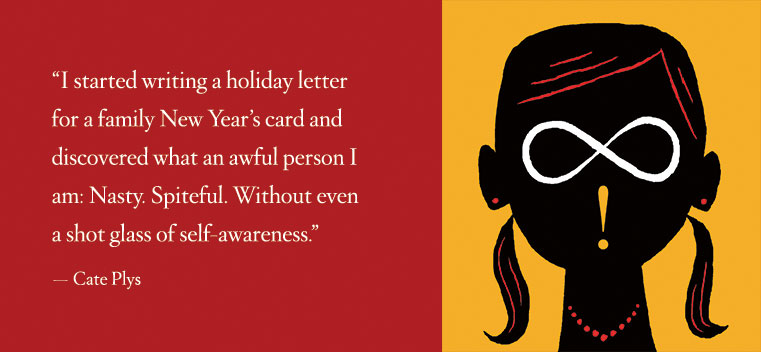
Mean Girl
Cate Plys ’84 of Chicago is a playwright and former political columnist for the Chicago Reader and the Chicago Tribune.
Tell us what you think. E-mail comments or questions to the editors at letters@northwestern.edu.
Ever wonder about those strange designations we use throughout Northwestern to identify alumni of the various schools of the University? See the complete list.
Find Us on Social Media
You can try to whistle a different tune later in life, but you might be stuck with the same personality you had in high school.
Everyone wants you to meditate these days. Clear your mind; breathe; stop thinking. They’re right. Thinking is dangerous business. Even casual thought can turn into actual introspection, and who needs that?
Last January, for instance, I started writing a holiday letter for a family New Year’s card and discovered what an awful person I am: Nasty. Spiteful. Without even a shot glass of self-awareness.
Worse, I realized I’d gone through that exact sequence before — from casual thought to disturbing memory to unpleasant awareness of moral bankruptcy.
The first time was 1987. I accompanied a Northwestern pal to his reunion. Imagining people I might see, I pictured someone I felt I had accidentally but unforgivably offended. That made me remember two more offenses, against two other people. Naturally, I was distressed. We’re all heroes in our personal narratives, not deeply flawed unlikable antiheroes.
I became obsessed with finding those three people and apologizing. Afterward, I would sin no more, my whole life redeemed at age 25.
I did find those people and apologize. But I also reveled in telling everyone I knew about my forgiveness quest. So I did three bad things, and when I apologized, I made it into a whole thing about me and didn’t realize it for more than two decades.
I only realize it now because I sat down to write that holiday letter last January. See, I started by reading some old cards for inspiration. Turns out I started the holiday letters as a parody of a holiday letter from some neighbors in Chicago who drove my husband and me crazy. Call them the Smiths.
The Smiths were masters of passive-aggressive crimes and misdemeanors. We’d been regaling friends with Smith stories for years. People asked me about the Smiths more often than they asked about my husband, my family or me.
So when they sent us a holiday letter, I decided to write our own letter. Every story about us would get sidetracked by the innocent description of a passive-aggressive atrocity perpetrated on us by the Smiths. Our friends would learn about our year incidentally, through the disguised ridicule of our neighbors. It’s not that I didn’t realize how mean that sounded at the time. It’s that the meanness sounded so funny, I couldn’t resist.
The letter was a hit, a gigantic, boffo achievement. Sequels followed. That our friends loved it and egged us on is no excuse. The kids in Carrie thought the pig’s blood was pretty funny too until the end. Eventually I stopped mentioning the Smiths and forgot all about them.
Then last January I looked at the old holiday cards for inspiration and reflected on their genesis. I remembered the forgiveness quest and finally understood the timeline: I began writing catty holiday letters right after the forgiveness quest. Rather than sinning no more, it was like I set out with the single ambition of becoming the most cold-hearted bastard possible.
Mulling it over, I considered a recent phone call with a dear high school friend, Tina. I told Tina about recently encountering a member of a stuck-up clique from our graduating class. Tina’s last run-in with this clique was at our 10th high school reunion. She was in a bathroom stall at the reunion restaurant when two clique members walked into the restroom and gossiped about her.
“I can’t believe she’s a lawyer,” said one.
Tina sprang out of the stall. “I won a multimillion-dollar judgment today,” she announced.
Over the phone with Tina, I speculated that some clique girls might have evolved since then.
“Noooooo!” yelled Tina. “People don’t change! The way someone is in high school is who they are, period!”
Tina’s certainty that I could safely hate people decades later was reassuring. Except, that would also mean I can’t change — that I’ll look up when I’m collecting Social Security and remember a new set of callous things I did after I wrote this.
I took a Nietzsche class at Northwestern with wonderful professor Erich Heller. I can still hear his aristocratic German accent as he explained the eternal recurrence, which I don’t mean ironically. Despite Professor Heller’s best efforts, the eternal recurrence always seemed like a goofy idea Nietzsche invented to torture himself. Now the eternal recurrence just sounds like a fancy way to explain Tina’s theory that no one ever changes.
Tina is exceptionally intelligent. Toe-to-toe with Nietzsche, I would bet on Tina. If she agrees with him, there could be something to it.
I just hope Tina and Nietzsche are wrong. It’s something to meditate on, anyway.



 Facebook
Facebook Twitter
Twitter Email
Email


